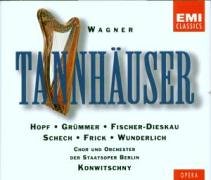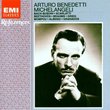| All Artists: Richard [Classical] Wagner, Franz Konwitschny, Karl Schmidt, Berlin State Opera Orchestra, Lisa Otto, Hans Hopf, Gerhard Unger, Dietrich Fischer-Dieskau, Rudolf Gonszar, Elisabeth Grummer, Manfred Koop, Marianne Schech, Arnold Schremm, Reiner Suß, Karl-Heinz Voortmann, Michael Wein, Fritz Wunderlich, Reiner Süss Title: Richard Wagner: Tannhäuser Members Wishing: 0 Total Copies: 0 Label: Angel Records Release Date: 7/1/1991 Album Type: Import Genre: Classical Style: Opera & Classical Vocal Number of Discs: 3 SwapaCD Credits: 3 UPC: 077776321424 |
Search - Richard [Classical] Wagner, Franz Konwitschny, Karl Schmidt :: Richard Wagner: Tannhäuser
 | Richard [Classical] Wagner, Franz Konwitschny, Karl Schmidt Richard Wagner: Tannhäuser Genre: Classical
|
Larger Image |
CD DetailsSimilar CDs |
CD ReviewsOne of the best available. John Austin | Kangaroo Ground, Australia | 12/17/2002 (5 out of 5 stars) "Everyone gets to know some of the great melodies contained in this opera. They are amongst Wagner's greatest. Not everyone gets to see it performed, however, so it has become one of those "theatre of the mind" operas that can be enjoyed at home, given a little imagination and one or other of the excellent audio productions issued in recent decades. This one derives from Berlin in the 1960s. It gives the opera in its original 1845 "Dresden" version. Thus the so-called "Venusburg Music" which Wagner interpolated in 1861 for a Paris production is not here. Those who favour the "don't sew a new patch onto an old wineskin" maxim, will believe that Wagner's original plan to have the overture conclude with a spectacular reprise of the "Pilgrim's Chorus" from the full weight of brass instruments and swirling strings is the better option. Franz Konwitschny was chosen as conductor for this recording. His long experience in German opera, especially Wagner, and his overall grasp of structure, whether phrasing the delicate woodwind passages before Wolfram's Act 3 aria or balancing the massive forces involved in the Act 2 finale, justify the choice. Insights into the opera's underlying representation of man struggle to choose between conflicting values are glimpsed as Konwitschny shapes the performance. The orchestra and chorus come from the Berlin State Opera, and their work is especially fine. As for the principal singers, well, there's an array of great German artists here. The matchless Elisabeth Grmmer is the Elisabeth. "An angel has come down from the sky," sing the knights and minstrels, and you'll not want to disagree. Matchless also is Gottlob Frick, as her uncle, the Landgraf. His deep bass voice with its gleaming resonance commands attention. It is hard to imagine a better Wolfram than Fischer-Dieskau provides. Singing with the long breath, and his usual word colouring, he delivers the best performance of his Act 3 aria I have ever heard. Alert listeners will also recognize the sweet-voiced tenor Fritz Wunderlich in the small part of Walther. Tannhäuser is a thankless operatic role. As a character, Tannhäuser should be someone with whom we can identify, but this rarely happens. He who sings the part faces enormous challenges. Hans Hopf, certainly has the voice for the part, but he is often rough and unstylish in his use of it. Marianne Schech, like so many sopranos, somehow fails to provide the vocal enticement that befits a Venus. Lisa Otto, as the shepherd, tends to swallow her words. If there are some reservations about the casting, there are none about the sound quality. In luminous stereo, it captures the full range of solos, ensembles, on and off stage choruses and hunting horns that comprise this fascinating Wagner opera." Five --- for the memories. Howard G Brown | Port St. Lucie, FL USA | 06/04/2003 (5 out of 5 stars) "The lp set was my introduction to this opera when I was a teenager. I couldn't afford the four-record set when it came out, but the Chicago Public Library had a monophonic copy, and I took it out several times during my high school years. I still prefer the Dresden version; the Paris revisions just seem out of place and out of time to me. It was with great pleasure and fond memories that I added these cds to my collection.About Hopf. I really like him in the role. He's rough and scruffy, and I think those qualities suit the part -- even if this is lyric, not straight theater. But TANNHAUSER has always seemed to me the Wagner opera that Tennesse Williams "cloned" in his play NIGHT OF THE IGUANA: the wayward hero torn between the feverish sexuality of Venus and the cool purity of Elizabeth. Too obvious a parallel, I suppose, but read the play (as opposed to seeing the film) and see what you think.Meanwhile, I'm happy to have this fine set to hear again and again. It does wear well." Still the Best Tannhaeuser Ralph J. Steinberg | New York, NY United States | 12/24/2005 (5 out of 5 stars) "To me, Tannhaeuser is the most underrated of Wagner's operas. It marks a tremendous advance over The Flying Dutchman in its dramatic and musical deliniations, while avoiding the pallid sanctimoniousness of Lohengrin, my least favorite opera in the Wagner canon. I also favor the stylistic consistency of the Dresden Version over the Paris, in which Wagner had to concede to popular taste by writing the extended Venusberg Bacchanale. Happily, this recording is of the Dresden Version.
As another reviewer also said, I first encountered this set while in my teens (16, to be exact) and was enthalled from the very first. I had heard tenor Hans Hopf in a Bayreuth broadcast of the Ring, with him as Siegfried, and was at the time completely taken with the power of his voice and the utter amiability of his portrayals-some vocal strain or awkwardness didn't matter, and still doesn't. Hopf's Tannhaeuser is a knight clearly in conflict with the religious and sexual ideals and mores of his time, and gains our sympathies for well-meaning albeit sexually frustrated individual. His "Erbarm dich mein" in Act 2 is heartwrenching in its poignancy; at times, he reminds me of Max Lorenz, for me the GREATEST of the heroic tenors, FAR greater than the overrated Melchior. Elizabeth Gruemmer is perfection itself, very much in the same class as Maria Mueller. Gottlob Frick, as always, sings with dignity and warmth, and outclasses very other Landgraf save Ivar Andresen. Dietrich Fischer-Dieskau's Wolfram is really luxury casting, a compassionate, spellbinding interpretation that has never been equalled in my experience. Marianne Schech's Venus is perhaps a bit fluttery, but dramatically she scores tremendously in her outraged curse in Act 1. Fritz Wunderlich's Walther is another bit of luxury casting; he really spoils the listener. Franz Konwitchny also outdoes others in this score; he accomplishes a perfect balance between drama and poetic lyricism. Tempi, neither rushed nor dragged, fit like a glove. I therefore nominate this as the essential Tannhaeuser. For a suppliment, I would suggest the 1930 Bayreuth performance on Pearl, conducted by Karl Elmendorf. It is abridged, uses the Paris Version and has a very uneven Tannhaeuser in Sigismund Pilinsky. But the other members of the cast are sterling and pretty much in the same class as the present recording. But if you're only in the market for one Tannaheuser, get this one." |

 Track Listings (8) - Disc #1
Track Listings (8) - Disc #1

